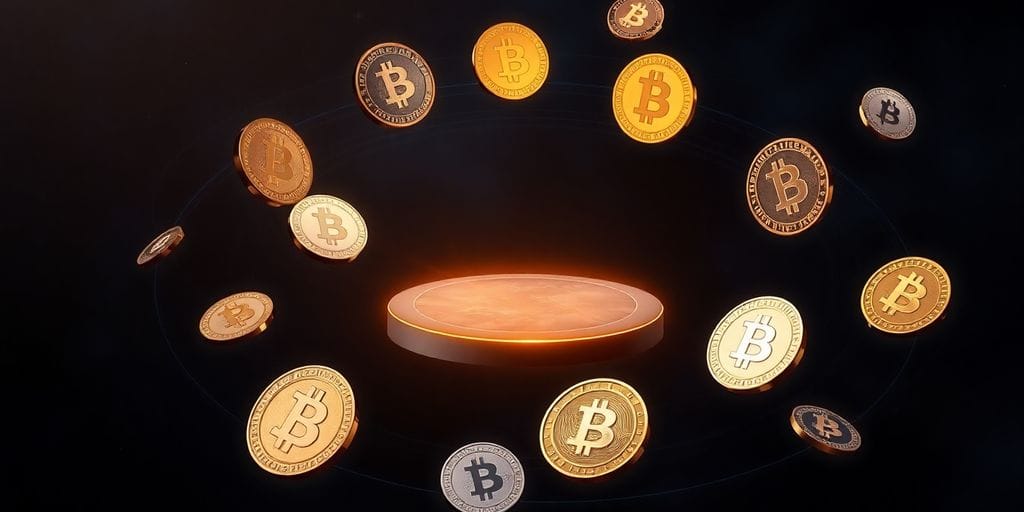Picking the right popular crypto exchange can feel like a big deal, especially with so many out there. You want to make sure your money is safe and that you can actually do what you want with your crypto. This article will help you figure out what makes a popular crypto exchange good, so you can pick one that works for you without all the stress.
Key Takeaways
- A popular crypto exchange can be centralized or decentralized, and knowing the difference helps you pick the right one.
- Your personal investing style and what you want to do with your crypto should guide your choice of a popular crypto exchange.
- Security is super important, so always look into how a popular crypto exchange protects your stuff and what you can do to help.
- Fees and what digital currencies you can trade really matter for your daily investing on a popular crypto exchange.
- Always check out what other people say about a popular crypto exchange and if they follow the rules before you commit.
Understanding Popular Crypto Exchange Types

So, you’re thinking about getting into crypto? Cool! First things first, you gotta know what kind of crypto exchanges are out there. It’s not a one-size-fits-all deal. There are a couple of main types, and they work pretty differently. Knowing the difference is key to picking the right one for you.
Centralized Exchange Operations
Think of centralized exchanges (CEXs) like your regular stock market, but for crypto. They’re run by a company that acts as an intermediary between buyers and sellers. This means they handle everything from storing your crypto to matching trades. The upside? They’re usually pretty easy to use, have lots of different coins available, and can handle a high volume of trades. The downside? You’re trusting them with your crypto, which means they could get hacked, or the company could go bust. Plus, they often require you to hand over personal info, which some people aren’t too keen on.
Decentralized Exchange Advantages
Decentralized exchanges (DEXs) are a whole different ballgame. Instead of a company running the show, they use smart contracts to let people trade directly with each other. This means no middleman, more privacy, and you keep control of your crypto. Sounds great, right? Well, there are downsides too. DEXs can be trickier to use, often have fewer coins available, and can be slower than CEXs. Plus, if you mess up a trade, there’s usually no one to help you out. It’s all on you.
Key Differences in Exchange Models
Okay, so what are the real differences? Here’s a quick rundown:
- Control: CEXs hold your crypto; DEXs don’t.
- Privacy: CEXs usually require KYC (Know Your Customer) info; DEXs often don’t.
- Ease of Use: CEXs are generally easier to use; DEXs can be more complex.
- Security: CEXs are a bigger target for hackers; DEXs are generally more secure, but you’re responsible for your own security.
- Liquidity: CEXs usually have more trading volume; DEXs can have lower liquidity, making it harder to buy or sell quickly.
Choosing between a CEX and a DEX really comes down to what you value most. Do you want convenience and lots of options, or do you prioritize privacy and control? There’s no right or wrong answer, just what’s best for you. Also, consider the available currency pairs on each exchange.
Selecting a Popular Crypto Exchange

Aligning With Investment Preferences
When you’re picking a crypto exchange, it’s not just about picking the one your friend uses. It’s about finding one that fits you. Think about what you want to get out of crypto. Are you in it for the long haul, or are you trying to make a quick buck? Are you okay with risk, or do you want something safer? Your answers to these questions will help you narrow down your choices. For example, if you’re risk-averse, you might want to stick with bigger, more established exchanges. If you’re looking to trade less common coins, you’ll need an exchange that offers altcoins.
Considering Trading Style Compatibility
Not all exchanges are created equal, especially when it comes to how they let you trade. Some are built for people who trade all day, every day. Others are better for people who just want to buy and hold. If you’re a day trader, you’ll want an exchange with lots of tools and fast execution. If you’re a long-term investor, you might care more about things like staking options and security. It’s like picking the right tool for the job – you wouldn’t use a hammer to screw in a screw, right?
Evaluating User Experience and Interface
Let’s be real: some crypto exchanges look like they were designed in the 90s. A clean, easy-to-use interface is important, especially if you’re new to crypto. You want to be able to find what you’re looking for without getting lost in a maze of charts and numbers. Look for exchanges with good mobile apps, clear instructions, and helpful customer support. A bad interface can lead to mistakes, and in the world of crypto, mistakes can be costly.
It’s easy to get caught up in the hype around different exchanges, but at the end of the day, the best one is the one that you find easiest to use and that meets your specific needs. Don’t be afraid to try out a few different platforms before settling on one.
Prioritizing Security on a Popular Crypto Exchange
Security is a big deal when you’re dealing with crypto. You’re trusting these platforms with your money, so you want to make sure they’re doing everything they can to keep it safe. It’s not just about the exchange’s security, but also what you do to protect your own account.
Importance of Robust Account Creation
Think of your account creation as building the first line of defense. The stronger it is, the harder it is for bad actors to get in. I mean, it sounds obvious, but people still use weak passwords. A strong password is a must, and don’t reuse it across different sites.
Here’s a quick checklist:
- Use a password manager to generate and store complex passwords.
- Enable two-factor authentication (2FA) on your account. This adds an extra layer of security, requiring a code from your phone in addition to your password.
- Be wary of phishing attempts. Always double-check the website address before entering your login details.
Safeguarding Digital Assets Offline
Keeping your crypto on an exchange is like keeping all your cash in your wallet all the time. It’s convenient, but risky. A better approach is to store the bulk of your holdings offline, in what’s called a cold wallet. Think of it as a digital safe deposit box. It’s not connected to the internet, so it’s much harder to hack.
It’s a good idea to only keep what you actively trade on the exchange. The rest should be tucked away safely offline. This way, even if the exchange gets hacked, your main stash is safe.
Assessing Exchange Security Protocols
Do some digging into the exchange’s security measures. What are they doing to protect your assets? Look for things like:
- Cold Storage: Does the exchange store a significant portion of its assets offline?
- Insurance: Does the exchange have insurance to cover losses in case of a hack?
- Regular Audits: Are the exchange’s security systems regularly audited by third-party firms?
Also, check out what other users are saying. Have there been past security incidents? How did the exchange handle them? An exchange’s response to past problems can tell you a lot about how seriously they take security. It’s worth checking out the Better Business Bureau’s grading system to see if the exchange has any complaints or scandals associated with it.
Navigating Fees and Trading Pairs on a Popular Crypto Exchange
Understanding Fee Structures
Okay, so you’ve found a crypto exchange that seems pretty good. It looks secure, the user reviews are decent, but now it’s time to get into the nitty-gritty: fees. Different exchanges have wildly different fee structures, and understanding them is super important. You don’t want to be surprised by hidden costs eating into your profits. Some exchanges charge a flat fee per trade, while others use a tiered system based on your trading volume. Maker and taker fees are also common; makers provide liquidity to the order book, while takers remove it. It’s a bit confusing, I know, but doing your homework here can save you a lot of money in the long run. For example, Binance.US and Robinhood offer some of the lowest fees around.
- Flat fees: A fixed amount for each trade.
- Tiered fees: Fees that decrease as your trading volume increases.
- Maker/Taker fees: Different fees depending on whether you’re adding or removing liquidity.
Exploring Available Currency Pairs
Beyond fees, you need to check out what currency pairs the exchange offers. If you’re only interested in trading Bitcoin against USD, most exchanges will work. But if you’re looking to trade some obscure altcoin against another, your options might be limited. Major exchanges like Coinbase offer a wide variety of assets, with Coinbase offering over 300 tradeable pairs. Smaller exchanges might specialize in certain niches, so it really depends on what you’re trying to do. Make sure the exchange supports the coins you want to trade, and that there’s enough trading volume to ensure you can actually buy and sell when you want to.
Impact on Daily Investing
How do fees and available trading pairs actually affect your daily investing? Well, if you’re a day trader making lots of small trades, even small fees can add up quickly. You’ll want an exchange with low fees, even if it means sacrificing some features or coin selection. On the other hand, if you’re a long-term investor who only buys and holds, fees are less of a concern. Similarly, if you’re only trading popular coins, you don’t need an exchange with a huge selection. But if you’re trying to get in on the next big thing, you’ll need an exchange that offers a wide range of altcoins. It’s all about aligning the exchange’s features with your investment strategy.
Choosing the right exchange is a balancing act. You need to weigh the fees against the available trading pairs, and consider how both of those factors will impact your overall investment strategy. There’s no one-size-fits-all answer, so take your time, do your research, and choose an exchange that fits your specific needs.
Researching a Popular Crypto Exchange’s Reputation
It’s easy to get caught up in the excitement of crypto, but before you jump in, take a breath and do some digging. You wouldn’t hand your money over to a stranger on the street, right? Same principle applies here. Let’s look at how to make sure your chosen exchange isn’t going to disappear with your hard-earned cash.
Investigating User Feedback
First things first, see what other people are saying. Don’t just rely on the glowing reviews on the exchange’s website. Look for independent forums, review sites, and even social media. Are users complaining about slow withdrawals, hidden fees, or poor customer service? A pattern of negative feedback is a major red flag. It’s also worth checking out what people are saying about Crypto.com mobile app, if you’re considering using it.
Examining Past Security Incidents
Has the exchange been hacked before? If so, how did they handle it? Did they compensate users who lost funds? A history of security breaches doesn’t automatically disqualify an exchange, but it does mean you need to proceed with extra caution. Find out what steps they’ve taken to improve their security since the incident. Look for details about their security protocols and whether they’ve had a third-party audit.
Reviewing Regulatory Compliance
Is the exchange complying with regulations in your jurisdiction? This can be tricky because crypto regulations are still evolving, but a reputable exchange should be transparent about its compliance efforts. Look for information about licenses, registrations, and anti-money laundering (AML) policies. If an exchange is operating in a legal gray area, it might be best to steer clear.
It’s important to remember that the crypto world is still relatively new, and things can change quickly. An exchange that seems reputable today could face problems tomorrow. That’s why it’s crucial to stay informed and regularly review your chosen exchange’s reputation.
Here’s a quick checklist to keep in mind:
- Check multiple sources for user reviews.
- Investigate past security incidents and the exchange’s response.
- Verify regulatory compliance.
- Stay updated on any news or developments related to the exchange.
Choosing the Best Popular Crypto Exchange for Your Needs
Alright, so you’ve done your homework, looked at the different types of exchanges, and thought about security. Now comes the big question: which popular crypto exchange is actually right for you? It’s not a one-size-fits-all kind of deal, and what works for your buddy might be a terrible fit for your own situation. Let’s break it down.
Identifying Personal Preferences
First off, be real with yourself. What do you really want out of a crypto exchange? Are you trying to day trade like a pro, or are you planning to buy some Bitcoin, Ethereum and hold on for the long haul? Do you need a ton of fancy charting tools, or are you happy with something simple? Think about:
- Investment Goals: What are you hoping to achieve with crypto? Quick profits? Long-term growth? Something else?
- Risk Tolerance: Are you okay with wild price swings, or do you prefer something more stable?
- Time Commitment: How much time are you willing to spend actively managing your crypto?
Comparing Centralized and Decentralized Options
This is a big one. Centralized exchanges (CEXs) are like your traditional stockbrokers – they’re easier to use, have more features, and usually offer customer support. Decentralized exchanges (DEXs), on the other hand, are more like the Wild West – more freedom, more privacy, but also more risk.
Choosing between a CEX and a DEX really comes down to your comfort level with technology and your priorities. If you value ease of use and customer support, a CEX is probably the way to go. If you’re all about privacy and decentralization, a DEX might be a better fit.
Here’s a quick comparison:
| Feature | Centralized Exchange (CEX) | Decentralized Exchange (DEX) |
|---|---|---|
| Ease of Use | High | Low |
| Security | Varies | High (in theory) |
| Customer Support | Usually Available | Limited or None |
| Privacy | Lower | Higher |
Considering Beginner-Friendly Platforms
If you’re just starting out, don’t try to jump into the deep end. Some exchanges are way more user-friendly than others. Look for platforms with a clean interface, helpful tutorials, and good customer support. Coinbase is often recommended as a good starting point, but do your research and see what feels right for you. Don’t be afraid to try out a few different platforms before settling on one. The goal is to find an exchange that you feel comfortable using and that meets your specific needs.
Wrapping It Up
So, picking a crypto exchange is a big deal, right? It’s not just about finding a place to buy and sell. You gotta think about what you need, how much you’re okay with risking, and what kind of trading you like. There are tons of choices out there, so take your time. Look into their security, check out the fees, and see what other people are saying. Don’t just jump on the first one you see. A little bit of looking around can save you a lot of trouble later on. Find an exchange that feels right for you, and you’ll be good to go.
Frequently Asked Questions
What’s the top crypto exchange to use?
Picking the best crypto exchange really depends on what you need and like. If you want to trade directly with other people without a middleman, decentralized exchanges like PancakeSwap or UniSwap are popular. But if you prefer a more official setup with a company helping you trade, then Coinbase or Kraken are widely used in the U.S.
Which crypto exchange is good for beginners?
For folks just starting out with crypto, exchanges that are easy to use and understand are best. Look for ones with simple layouts and clear instructions. Many popular exchanges have special features for new users to help them learn the ropes without getting confused.
What’s the difference between centralized and decentralized crypto exchanges?
Centralized exchanges are run by companies, kind of like a bank for crypto. They offer things like easy ways to put in regular money and lots of trading options. Decentralized exchanges, though, are run by their users on the blockchain, meaning you trade directly with others. They focus more on privacy and security.
How can I make sure my crypto is safe on an exchange?
Keeping your crypto safe is super important. A good exchange will have strong security steps for when you create your account. It’s also smart to move most of your digital money to an offline storage device, like a cold wallet, after you buy it. This keeps it safe from online threats.
What should I know about fees and trading options on a crypto exchange?
Crypto exchanges make money through fees, which can be different depending on what you’re doing, like buying, selling, or moving crypto. They also offer different trading pairs, which means you can swap one type of crypto for another, or crypto for regular money. Always check these fees and pairs to see how they’ll affect your daily trading.
How do I check if a crypto exchange is trustworthy?
Before you pick an exchange, do some homework! See what other users are saying about it. Look into any past security problems and how the exchange handled them. Also, check if they follow the rules and laws. A good reputation means they’re trustworthy.










